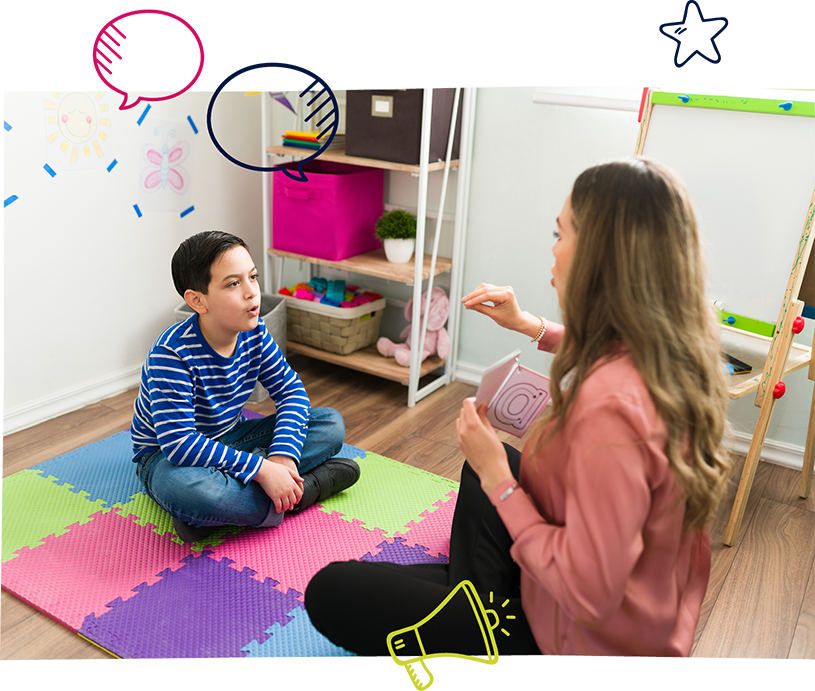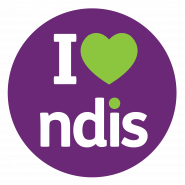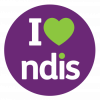NDIS Speech Pathology & Therapy
Being able to communicate effectively with others and having the ability to safely swallow food are fundamental to a good quality of life.
Speech pathologists are university-trained allied health professionals who work to improve the quality of life of anyone who has difficulties with communicating or swallowing.
At Ability Action Australia, our NDIS speech pathologists work within a multidisciplinary healthcare team with other professionals to support children and adults who have difficulties with:
- Speech — correct production of the sounds in words
- Language — speaking and understanding others in a functional manner
- Voice — using the vocal cords to produce speech effectively
- Fluency — stuttering and cluttering
- Literacy — reading and writing
- Swallowing – safely consuming food and drinks
Ready to get started?

Who do speech therapists support?
A speech therapist supports people of all ages, from children living with disability to adults who have acquired a communication problem or who have had a disability from birth.
At Ability Action Australia, our NDIS speech therapists can work with you or your child to assess your ability to speak and understand others before creating a customised NDIS speech therapy session based on your specific speech and language needs.
As a leading NDIS speech pathology provider, we work with people living with a variety of conditions, including:
- Neurodevelopmental disorders such as autism spectrum disorder, Down syndrome, cerebral palsy, and intellectual disability
- Degenerative neurological conditions such as Alzheimer’s or Parkinson’s disease
- Developmental delays
- Brain injuries due to accident or illness
- Stroke
- Learning disability
- Dementia
- Hearing loss
What are the benefits of NDIS speech therapy?
Ongoing or intensive sessions with a speech therapist can be very beneficial for people living with complex disabilities or communication difficulties. These sessions offer a structured and supportive environment for individuals to develop and improve their communication skills, which in turn can help to enhance their overall quality of life.
Our NDIS speech therapists can help:
- Children to learn to communicate more effectively by supporting them in asking for wants and needs independently, supporting them with using functional words and phrases/sentences verbally or implementing a suitable Augmentative and Alternative Communication (AAC) system to supplement their expressive language
- Adults to better participate in life by supporting them in expressing their ideas, improving their confidence in social settings, improving their fluency or managing a safe swallow
NDIS speech therapy sessions can also have a positive impact on the psychological health of both children and adults. For individuals living with communication difficulties, not being able to express oneself effectively or understand others can lead to frustration, anxiety, and social isolation. A speech therapist can help individuals to develop better communication skills, which in turn can lead to improved self-confidence, self-esteem, and a greater sense of belonging within the community.
Are you ready to get started? It’s easy!
If you or a loved one need support with communication, why not reach out to an Ability Action Australia? Our friendly team is here to help you achieve your goals and improve your quality of life. Get in touch today!
Why choose us for NDIS speech pathology?
At Ability Action Australia, we’re proud to offer you and your family greater choice and reduced wait times for the support you need. We take the time to understand your unique circumstances, needs, and goals, to tailor your therapy and support you to achieve your NDIS goals.

Achieve your goals

Local speech therapists

Multidisciplinary Care
Multidisciplinary care is when a team of health professionals with different skills collaborate to support as many of your needs as possible. Our multidisciplinary team can support you to reach your goals!
Speech pathology Frequently Asked Questions
Speech pathology is a healthcare field that helps people who experience challenges with communication or swallowing. A speech pathologist, also commonly called a speech therapist, works with people of all ages to diagnose and treat speech, language, voice, fluency, and swallowing disorders.
As well as providing ongoing support, an NDIS speech therapist works closely with individuals, families, and caregivers to develop personalised treatment plans that aim to improve communication and swallowing abilities and enhance quality of life. These treatment plans may include a variety of techniques and strategies, such as exercises to strengthen the muscles used in speech and swallowing, modifications to the texture or consistency of foods and liquids to make swallowing easier and safer, and alternative communication methods such as assistive technology.
Speech pathologists diagnose and treat a wide range of communication and swallowing disorders. They play a crucial role in helping individuals to manage these conditions and improve their quality of life.
Disorders that an NDIS speech pathologist can treat may include:\
- Speech sound disorders, such as stuttering, lisps, or difficulty producing certain sounds.
- Language disorders, which can impact a person’s ability to understand or express themselves verbally or in writing.
- Voice disorders.
- Fluency disorders.
- Swallowing disorders, which can lead to difficulties with eating or drinking.
If you are interested in receiving NDIS speech pathology services with Ability Action Australia, contact our Concierge Team to get started. Depending on where you are in your journey, a speech pathologist may conduct an assessment during your first consultation to evaluate your communication or swallowing abilities, identify any areas of concern, and discuss your goals for therapy. From there, they will develop and implement a personalised treatment plan tailored to your specific needs and goals.
NDIS speech therapy sessions may be conducted in-person, online, or a combination of both, depending on your location and preferences. Your progress will be regularly monitored, and your treatment plan may be adjusted as needed to ensure that you are making progress towards your goals. Ability Action Australia’s approach prioritises working with you every step of the way to provide support and guidance, and to help you achieve the best possible outcomes.
Speech pathology can be very helpful for individuals with swallowing disorders, also known as dysphagia. An NDIS speech pathologist can evaluate the individual’s swallowing abilities, including identifying any physical or neurological issues that may be impacting their ability to swallow. Based on this evaluation, the speech pathologist can develop a personalised treatment plan that may include exercises to improve the strength and coordination of the muscles used in swallowing, modifications to the texture or consistency of foods and liquids, and other strategies to make swallowing safer and more comfortable.
Speech pathologists may also work closely with other healthcare professionals, such as dietitians, to ensure that individuals with swallowing disorders are receiving adequate nutrition and hydration. With speech pathology intervention, individuals with swallowing disorders may be able to improve their swallowing abilities, reduce the risk of aspiration and other complications, and enjoy a better quality of life.
As well as NDIS speech pathology and therapy, we provide a range of services including:
- Occupational therapy
Ability Action Australia’s NDIS registered and approved Occupational Therapy services focus on physical, psychosocial, sensory and cognitive disabilities. Whatever you need, our NDIS registered Occupational Therapists will assess your situation and provide personalised services to help you do the things you want and need to do, in the most effective way possible. - Exercise physiology
Our NDIS-registered Exercise Physiology service is designed to improve both the body and mind through the power of targeted exercise. Our experienced team of Exercise Physiologists develop customised exercise programs aimed at empowering individuals, by giving them the tools to self-manage their conditions and stay active. - Physiotherapy
Our NDIS-registered Physiotherapy services use a range of techniques to improve movement, and make everyday tasks easier for people of all ages living with various conditions. Our highly experienced physiotherapists use a range of techniques to help you achieve your personal goals, offering tailored care to enhance your daily life and live more independently. - Psychology
Ability Action Australia provides psychology services nationwide, with services available both in-person and online, ensuring accessible care for everyone. Our psychology clinicians will complete a disability focused assessment of psychology support needs to identify the cognitive, behavioural and emotional barriers and skill-deficits preventing you from achieving your NDIS goals. Our psychology clinicians will then generate an individualised, evidence-based intervention plan to address these. - Positive behaviour support
Positive Behaviour Support works to reduce or eliminate difficult behaviour and is the best approach for children and adults living with disability who display behaviours of concern. Our goal is to empower you by developing personalised strategies that foster independence and enhance wellbeing.
Yes, Ability Action Australia has a range of exciting employment opportunities as we continue to grow and support participants across the country. If you love seeing the difference that your support makes in a client’s life and being part of a positive and passionate team that care, we’d love to hear from you. Check out our NDIS jobs section!

NDIS Speech Pathology
The National Disability Insurance Scheme (NDIS) funds support for people with permanent and significant disability. The NDIS is designed to give individuals greater choice and control over when, where and how their funded supports are provided. The specific support and funding available is based on each individual’s specific needs. You can find out more about what therapeutic supports are funded by referring to the NDIS website.




